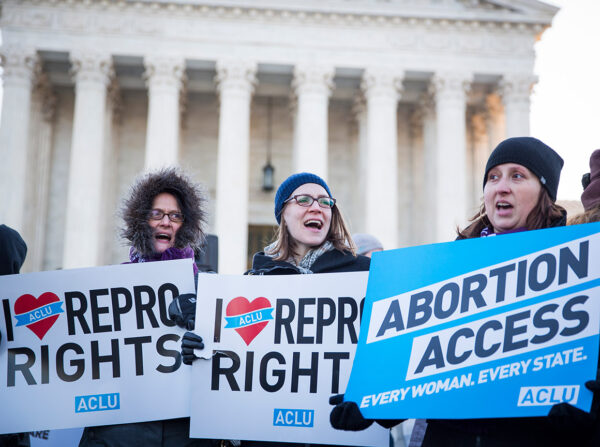Federal Court Overturns Lower Court Ruling, Allowing Ohio Lawmakers to Punish Doctors for Providing Abortion Care Based on Patient's Reason
The law punishes doctors with a felony charge for providing an abortion if the doctor knows the patient sought the abortion because of a fetal Down syndrome diagnosis
CINCINNATI — The full Sixth Circuit Court of Appeals issued an en banc ruling today, reversing a 2018 district court and a 2019 Sixth Circuit three judge panel decision in Preterm v. McCloud, upholding an Ohio law banning abortion if the doctor performing the procedure learns the patient is obtaining an abortion based on a Down syndrome diagnosis.
The law would charge doctors with a felony crime and take away their medical license if they know that the patient’s reason for the abortion was even partly related to a Down syndrome diagnosis. This Ohio law, and others like it, have been condemned by disability rights and justice advocates and organizations as an unjustified attack on bodily autonomy, which does nothing to address and systemic discrimination against people with disabilities.
“Everyone’s situation is different and we should all have the freedom to make the best decisions for ourselves and our families, especially when it comes to a personal decision like abortion. But this law takes away that right and gives politicians the power to approve or disapprove that decision,” said Alexa Kolbi-Molinas, senior staff attorney at the ACLU Reproductive Freedom Project. “If the politicians behind these laws really cared about the lives of people with disabilities they would stop punishing people who have abortions, and make sure people with disabilities have community-based supports, inclusive education, integrated housing and employment, and the freedom to make decisions about their lives and bodies.”
“Today’s ruling is an affront on the important, trusting relationship between healthcare providers and the individuals and families we serve,” said Chrisse France, executive director of Preterm. “Every day, Preterm’s staff and physicians talk with our patients about their lives, struggles, and realities. We work with our patients to ensure that each person is treated with respect and receives the highest quality healthcare, while politicians seek to undermine that relationship. Today, the Sixth Circuit allowed politicians to exploit the real needs and concerns of people with Down syndrome to push their anti-abortion agenda. At Preterm, we trust our patients and value their lives and decisions in all their complexity; no one should be able to make these decisions other than the patients and families we serve.”
“We are deeply disappointed that the Sixth Circuit decided to overrule the clearly correct decision from the district court,” added Jessie Hill, cooperating attorney for the ACLU of Ohio. “Patients should have all the information desired about their pregnancy, and be encouraged to ask questions confidentially in order to make the very personal decision to have an abortion freely, without the presence of politicians in the exam room. It’s unfortunate that the court gave so little weight to the importance of open and honest communication within the doctor-patient relationship.”
Ohio has failed people with disabilities time after time, leading advocates to file dozens of lawsuits against the state in recent years. The state recently settled multi-year litigation brought by to prevent long-term segregation of people with developmental disabilities, including people with Down syndrome, in institutions. These advocates had to sue Ohio so that people with Down syndrome could live in their communities, near their families and friends — not locked away in institutions.
“This abortion ban inserts politicians between patients and their doctors, denying services to those who need it,” said Alexis McGill Johnson, president and CEO, Planned Parenthood Federation of America. “This ban is right out of the playbook of anti-abortion politicians — punishing people who seek reproductive health care for political reasons, while doing nothing to address the serious discrimination people with disabilities face. While politicians dismantled reproductive health care and left them with fewer providers in Ohio, Planned Parenthood stood by our patients and worked to ensure patients could still access birth control, cancer screenings, and abortion. Today is no different, and we’ll keep fighting to ensure every person has access to the health care they need."
“This is a devastating blow to health care access in Ohio. Ohioans already face major hurdles when accessing reproductive health care and safe, legal abortion. Lawmakers in Ohio should focus their attention on promoting laws that strengthen the health and rights of Ohioans and their families, rather than attempting to shame people for their private medical decisions,” said Kersha E. Deibel, president & CEO of Planned Parenthood Southwest Ohio Region, and Iris E. Harvey, president & CEO of Planned Parenthood of Greater Ohio. “Families do not need lawmakers intruding and passing judgment on their medical decisions. We will continue to stand up and fight back against efforts to decimate access to safe, affordable, high-quality reproductive health care and education services to Ohioans – no matter what."
This challenge was brought by the ACLU, the ACLU of Ohio, and Planned Parenthood Federation of America on behalf of Preterm, Planned Parenthood of Greater Ohio, Planned Parenthood Southwest Ohio Region, and Women’s Med Group Professional Corporation.


